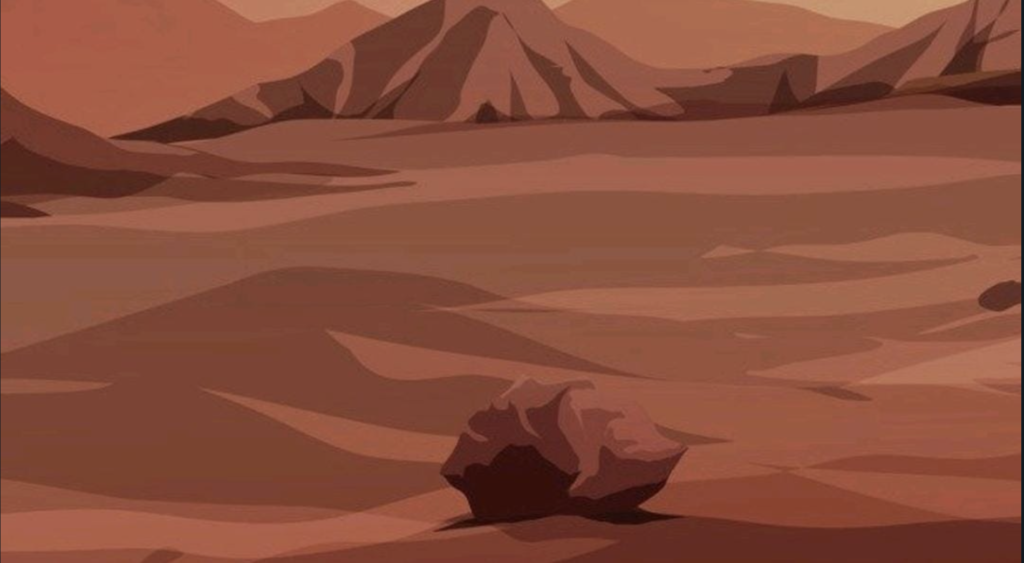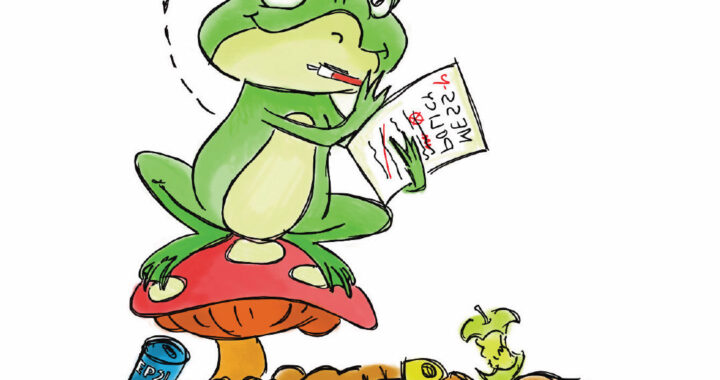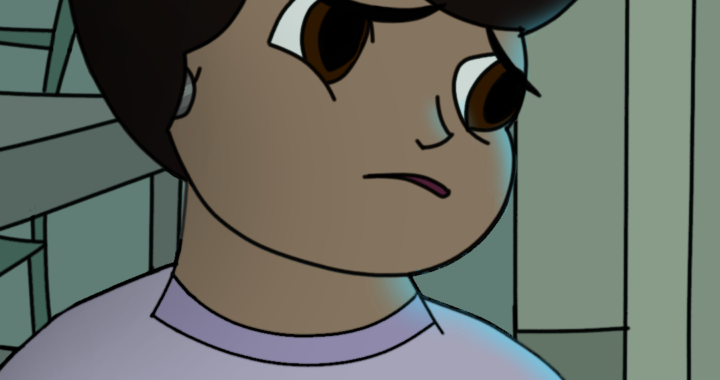Beep! Beep! Beep!

The familiar sound of my sleeping pod beeping wakes me up. I open my eyes and immediately feel the pod eject me like a disk from a port. I stretch my body and crack my joints. The artificial “ideal” environment created by the sleep pod for maximum comfort makes waking up feel natural and not forced. The perfect sleep rejuvenates the body for another day on Mars. Stretching, I go to the SterZone to freshen up and start the day. I dismount the Electric Toothbrush from where it is attached to the wall and hold it in front of my teeth, letting it do its job. As the high-pressure gases work on cleaning my teeth, I go through my schedule for the day, which is the same as always – monotonous, cyclic and robotic.
I was thinking about the trip to the Old Earther Museum that I would have to take today as research for course work when the brush beeps, signalling that it’s done. I hang it back up on the magnetic strip on the wall and proceed towards the shower. Before entering the shower stall, I scan my hand on the sensor. The sensor beeps and displays my name as I enter the booth. Keeping in mind the limited production and supply of water, every person is assigned a fixed volume of water per day to fulfil all their requirements. To access the allotted amount of water, the person needs to scan themselves in.
After showering, I get dressed and go to the kitchen for breakfast. I open the drawer designated for breakfast pills. Keeping in mind the mandatory trip to the museum, I pop a high-intensity pill and drink water to chase it down. The food pills were the hassle-free alternative that the scientists came up with in place of actual food. This, in turn, reduced one problem that the early settlers were worried about – farming fruits and vegetables on Mars.
After taking care of my breakfast, I go out to the common area and notice SmaHoS, our smart home system’s screen blinking. Sensing my presence in the room, SmaHos wakes up, and the system’s New Earther like voice, low pitched and slightly muffled, informs me of a message left by my parents about going to work early. The dense atmosphere on Mars with 96 percent carbon dioxide absorbs a lot of high pitch sounds and makes any sound muffled. So in order to be heard properly, evolution made the New Earther’s voice naturally low pitched. I dismiss the message with a flick of my hand and dictate a short reply to be sent to their private devices. Noting the time, I decided to get done with the trip to the museum. Having never visited the Old Earther Museum, I am not really sure what to expect. All that I know is that it contains artefacts and mementoes from life on Earth. I pocket my e-scroll and leave the house.
The e-scroll looks like its name – a mini scroll – but it is anything but that. Every new Earther has one. It is basically like your ID on Mars that holds every single piece of information about you. A click on one of the ends turns it into a virtual screen, too, useful for almost anything you’d want it to do. With internet access and the ability to write on it with just your fingertips, it is by far the best invention New Earthers have come up with.
It takes me 10 minutes to reach the museum. Once I reach and scan my e-scroll, an audio file is transmitted to it. The audio is to walk me through all the museum sections without feeling lost. I took a deep breath, pressed play on the audio, and started the tour from the Human Body section.
It turns out the Earth Humans were very different from how we, the New Earthers, look. For starters, they are incredibly shorter than an average New Earther. According to the audio, the considerably less gravity on Mars, as compared to Earth, results in the lengthening of our spine and joints. This further means that after years of evolution, humans’ average 5 ft something height turned into an average 7ft height of the New Earthers.
As shocking as the drastic difference in height is, there is something even more astounding. It turns out that the orange skin that we, the New Earthers, possess is not something we got from our human ancestors. It is yet another result of evolution. Due to the large amount of harmful UV radiation that we are exposed to on Mars, our bodies had to develop pigments such as carotenoids to protect from the harmful rays. Apparently, humans had a vegetable called carrot on Earth with the same pigments as us, which could mean that we look like a Human or New Earther form of their carrot vegetable. Interesting and mortifying.
After the Human Body section, I moved to ‘Life on Earth’. From the audio guide, and the exhibits, and pictures displayed, it was clear that the differences in our appearance were nothing compared to the contrasting lives that we lived. On Earth, it turns out that there were no sleeping pods, just a raised platform with some cushioning. The lack of a sleep-inducing environment created from the pod made me sceptical about their quality of sleep. Not only that but there was no restriction on the amount of water that a human could use for their everyday activities. There was actual food with flavours available for consumption. Food was not just consumed to provide nutrition and energy but also as a form of enjoyment on Earth. So, every day you had the liberty of choosing from various dishes with different flavours and textures. My mind could not even comprehend the flavours mentioned in the exhibits – sweet, spicy, sour, bitter and what not. Contrary to this, every morning, the only choice I make is whether I require a high, medium or low-intensity pill for the day.
One of the exhibits had an actual printed newspaper on display. It’s weird to think of things still being printed. Now, everything is digitised, with no need for paper or printing. This one change I don’t mind or care about. I don’t think we can even afford to make paper considering the lack of natural oxygen and water on Mars compared to Earth. While going through the Life on Earth section of the museum, many things stood out to me. The concept of trying food for pleasure or buying clothes for fashion instead of their practicality. The idea of going on vacations also seemed weird. To go to
a different state or country and their iconic monuments or locations. The whole vacation school of thought is an unknown concept on Mars. Where would we even go for a vacation, and what would we even see? New Earthers have created every place in the Mars dome, so they are exactly the same. When the early settlers set up the Mars colonies, there
were various concerns while creating a place for the future generations to live – the absence of natural oxygen in the atmosphere, the very low gravity on Mars, to name a few. And providing New Earthers with a vacation spot was unfortunately not one of them.
At one end of the hall, a device caught my attention. After scanning my face, it claimed that it could produce an accurate image of what my Earth counterpart would like. My curiosity resulted in me scanning my face and waiting the required 5 seconds to view my Earth face. The 3D hologram presented by the device was about 6 ft tall with black hair. The non-orange skin kept throwing me off, and for a couple, I couldn’t focus on any other feature. After considerable struggle, I squinted my eyes and tried to concentrate on the facial structures. There were differences in the facial structure as well. The human face was more round, softer than the New Earther’s usual elongated and hardened face. Looking at the clothes on the hologram suddenly made me feel suffocated in my tight mars’ gravity appropriate suit. The loose shirt and pants made me envious of something I never even had before – comfort.
This whole trip to the museum made me question our way of living life. Walking through the halls of the museum, one thing became clear to me. The life humans lived was very relaxed compared to the one that we live. Throughout the 687 days in a year, all we do is work. Every day is the same monotonous cycle. We have all the advanced technology that humans once couldn’t even dream of. But it looks like we left the simple joys of living back on Earth when we migrated to Mars. For the last 100 years that we have been New Earthers, we have worked every day. In the beginning, it was a necessity. The unknowns of a new planet made hard work and carefulness a necessity. And later, it became a habit, a habit required to make a living on a planet not naturally suitable for living, not naturally like Earth anyway.
I transferred the hologram to my e-scroll with a touch on the screen and moved on. For the next half hour, I completed my tour of the museum. There were a lot of things that I came to know about Earth and humans. Small stuff that doesn’t have much impact like the average days in a year on Earth was 365 days, almost half of what a year constitutes for us. And humans not only did catalogue time in terms of 12 months instead of our 24 but also associated celebrations with them. They celebrated when a new year started, played with colours at the beginning of summer, gave gifts when it snowed. It looked like they just needed a reason to celebrate and enjoy. A lifestyle completely different from the one we are accustomed to.
Then there were the big differences, like the different forms of governance. For us on Mars, we cannot even imagine what it must be like to not follow a rule, to risk your life or even worse, to contend a law just because you think you know better. The great unknowns of a planet and complete freedom on the said unknown planet can quickly turn civilization chaotic. The strict rules imposed on us are important to make sure we can survive. Humans could afford leniency, but Mars doesn’t allow mistakes. To be clear, we don’t live a life full of despair or fear, but we are also not as free to do what we want as people in ‘Democracy’ were on Earth. What must it feel like to live a life where you could go anywhere, do anything and not feel like it could affect the lives of thousands on the planet.
That night as I got ready to sleep, I couldn’t help but wonder what my life would be like on planet Earth. As the sleep pod started to slowly darken the insides and starts playing a particular sound meant to put me to sleep, the last thought on my mind was whether the human race, as they were called on Earth, were really better off on Mars or were we just fooling ourselves.


 Cleaning up the Mess?
Cleaning up the Mess?  We Are So Cooked
We Are So Cooked  Qu’ils mangent de la grenouille! (Let Them Eat Frogs!)
Qu’ils mangent de la grenouille! (Let Them Eat Frogs!)